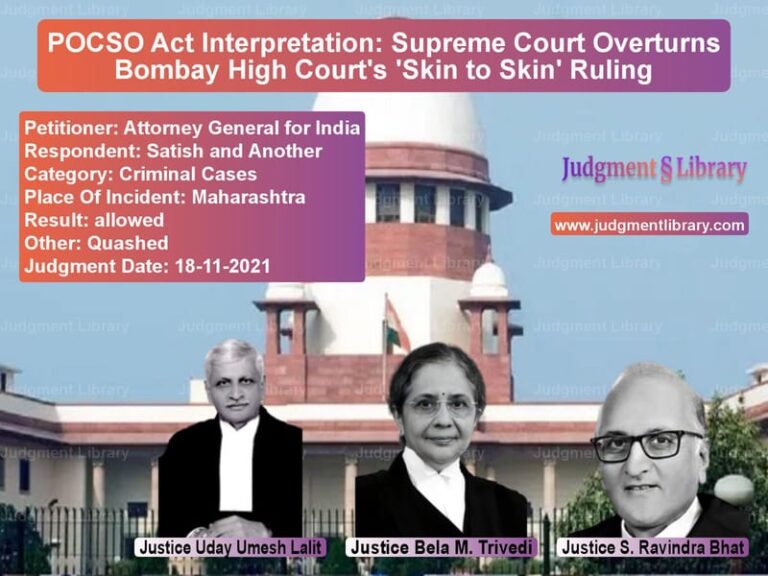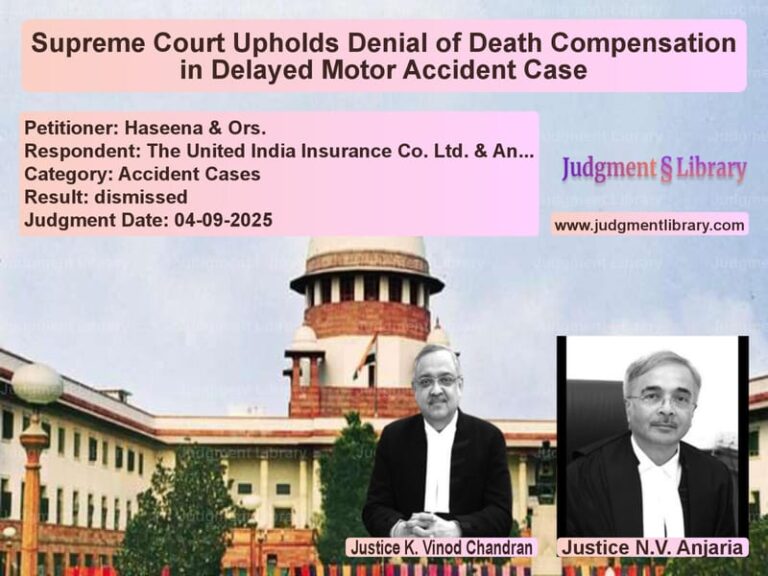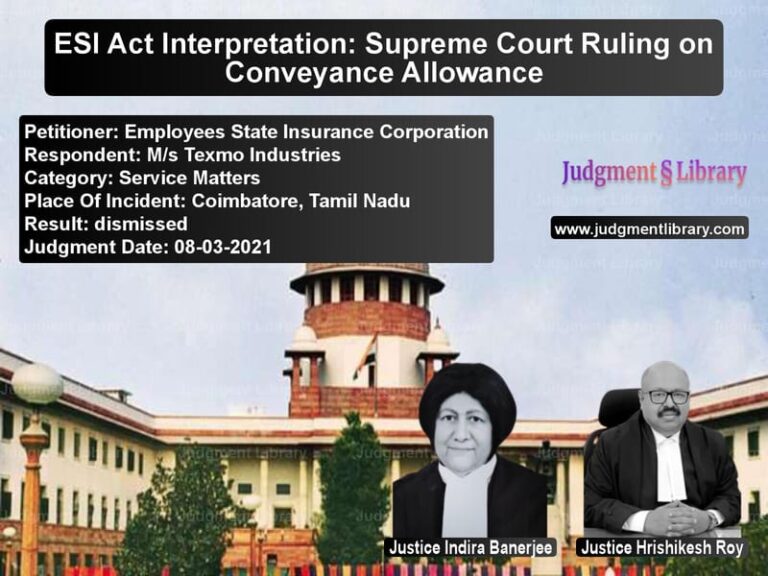Supreme Court Upholds Dismissal of CRPF Constable for Misconduct
The Supreme Court of India, in its judgment dated 11 November 2021, upheld the dismissal of Ex-Constable Ram Karan from the Central Reserve Police Force (CRPF) for serious misconduct. The case, Union of India & Ors. vs. Ex. Constable Ram Karan, involved disciplinary proceedings initiated against the respondent for assaulting a senior medical officer and making false allegations.
Background of the Case
The respondent, Ram Karan, was employed as a Constable Driver in the CRPF. On 12 September 2003, he forcibly entered the chamber of Dr. Nazir, a senior medical officer, and demanded attestation of medical reimbursement claims. Upon the doctor’s refusal, he physically assaulted him, causing injuries. Later, in an attempt to justify his actions, Ram Karan and his wife falsely accused the doctor of sexual harassment.
Following a disciplinary inquiry, the CRPF authorities found him guilty of misconduct and removed him from service on 14 July 2004. His appeals before the Appellate and Revisional Authorities were dismissed. He then challenged the decision in the Delhi High Court.
High Court’s Ruling
The Delhi High Court upheld the disciplinary authority’s finding that Ram Karan was guilty of misconduct. However, it substituted the penalty of dismissal with confinement in a quarter guard from 1:00 PM to 10:00 PM and ordered his reinstatement with full salary and pensionary benefits.
Petitioner’s Arguments (Union of India)
The Union of India, represented by Additional Solicitor General Madhavi Divan, argued:
- The High Court exceeded its jurisdiction under Article 226 by interfering in the quantum of punishment.
- The respondent’s conduct was grave, involving assault and false accusations.
- CRPF personnel are held to higher disciplinary standards, and such misconduct warranted dismissal.
- The High Court failed to consider Section 11(1) of the CRPF Act, which allows for dismissal or other punishments.
Respondent’s Arguments (Ram Karan)
Ram Karan’s counsel contended:
- He had an unblemished record of 11 years before the incident.
- The incident was spontaneous and not premeditated.
- The High Court rightly considered proportionality and reduced the punishment.
Supreme Court’s Observations
The Supreme Court bench, comprising Ajay Rastogi and Abhay S. Oka, made the following observations:
- The CRPF, being a disciplined force, has strict service conditions, and members must adhere to the highest standards of conduct.
- Interference in disciplinary matters is permitted only when punishment is shockingly disproportionate.
- Assaulting a superior officer and making false allegations are serious offenses that justify removal from service.
- The High Court wrongly substituted its discretion for that of the disciplinary authority.
Key Supreme Court Rulings Cited
The Court relied on several precedents, including:
- B.C. Chaturvedi vs. Union of India (1995) – Courts should not interfere with punishment unless it is shockingly disproportionate.
- Union of India vs. Ghulam Mohd. Bhat (2005) – Reinforcing strict discipline in paramilitary forces.
- Lucknow Kshetriya Gramin Bank vs. Rajendra Singh (2013) – Courts should avoid substituting penalties unless absolutely necessary.
Final Judgment
The Supreme Court ruled in favor of the Union of India, stating:
- The Delhi High Court’s judgment was quashed.
- The dismissal order by CRPF authorities was upheld.
- Ram Karan’s reinstatement was revoked.
Implications of the Judgment
The Supreme Court’s ruling has significant implications for service law:
- Strict Enforcement of Discipline: The judgment reiterates that security personnel must adhere to the highest standards of behavior.
- Limited Scope of Judicial Review: Courts should not lightly interfere with punishment imposed by disciplinary authorities.
- Protection Against False Allegations: The case sets a precedent that making false accusations to cover misconduct will not be tolerated.
The Supreme Court’s decision in Union of India vs. Ex. Constable Ram Karan ensures that disciplinary standards in paramilitary forces are upheld and that judicial review does not undermine internal disciplinary mechanisms.
Read also: https://judgmentlibrary.com/supreme-court-upholds-interest-demand-on-delayed-esi-contributions/
Petitioner Name: Union of India & Ors..Respondent Name: Ex. Constable Ram Karan.Judgment By: Justice Ajay Rastogi, Justice Abhay S. Oka.Place Of Incident: Delhi.Judgment Date: 11-11-2021.
Don’t miss out on the full details! Download the complete judgment in PDF format below and gain valuable insights instantly!
Download Judgment: union-of-india-&-ors-vs-ex.-constable-ram-ka-supreme-court-of-india-judgment-dated-11-11-2021.pdf
Directly Download Judgment: Directly download this Judgment
See all petitions in Disciplinary Proceedings
See all petitions in Public Sector Employees
See all petitions in Termination Cases
See all petitions in Judgment by Ajay Rastogi
See all petitions in Judgment by Abhay S. Oka
See all petitions in allowed
See all petitions in Quashed
See all petitions in supreme court of India judgments November 2021
See all petitions in 2021 judgments
See all posts in Service Matters Category
See all allowed petitions in Service Matters Category
See all Dismissed petitions in Service Matters Category
See all partially allowed petitions in Service Matters Category







